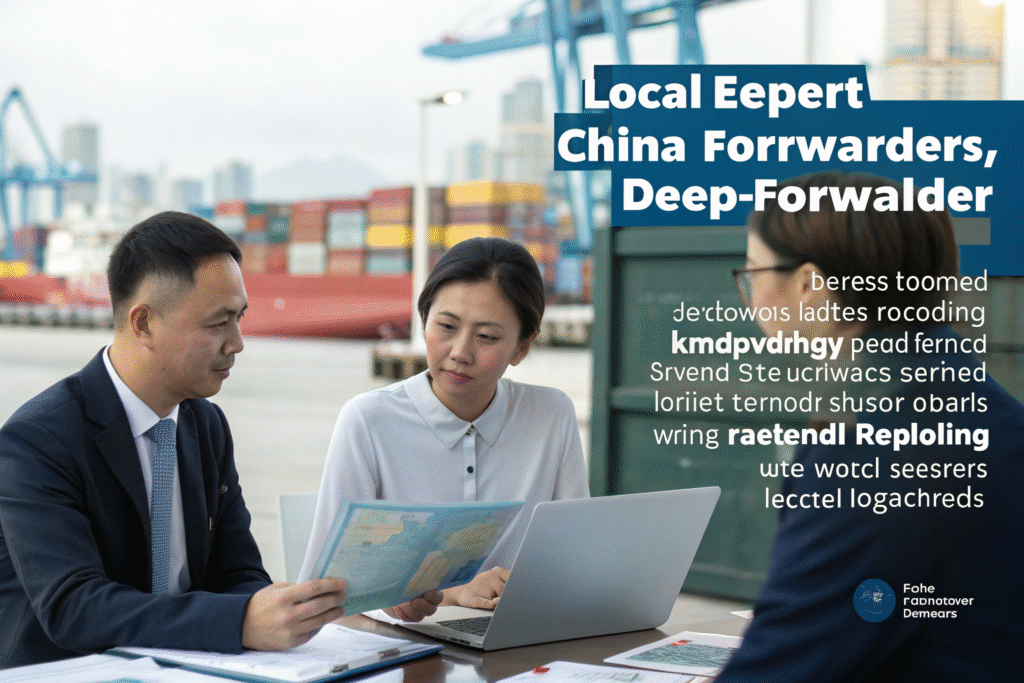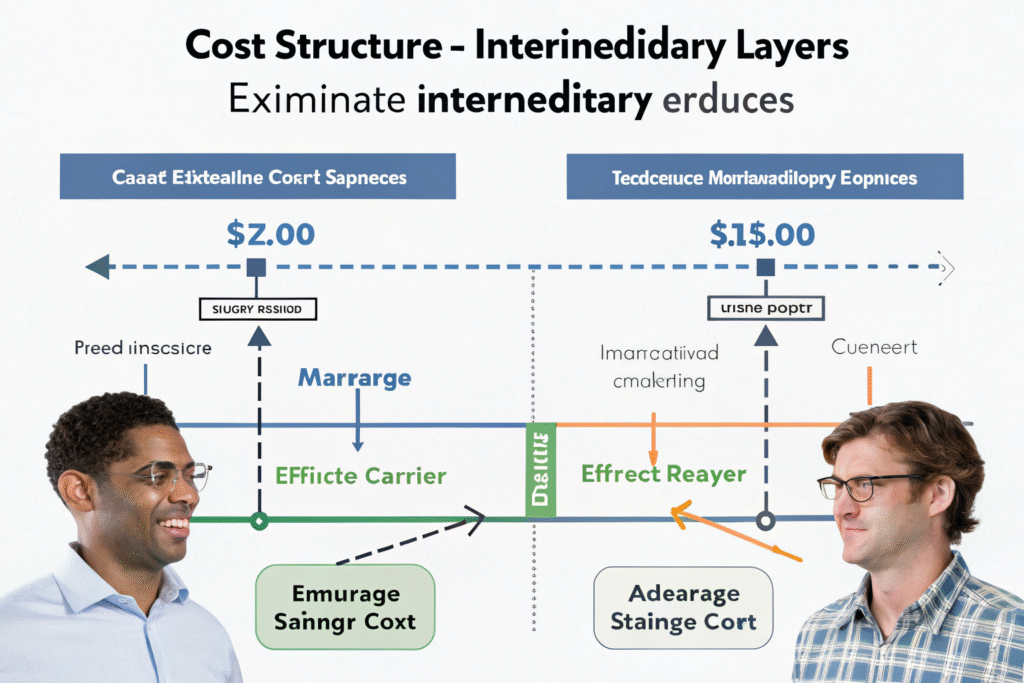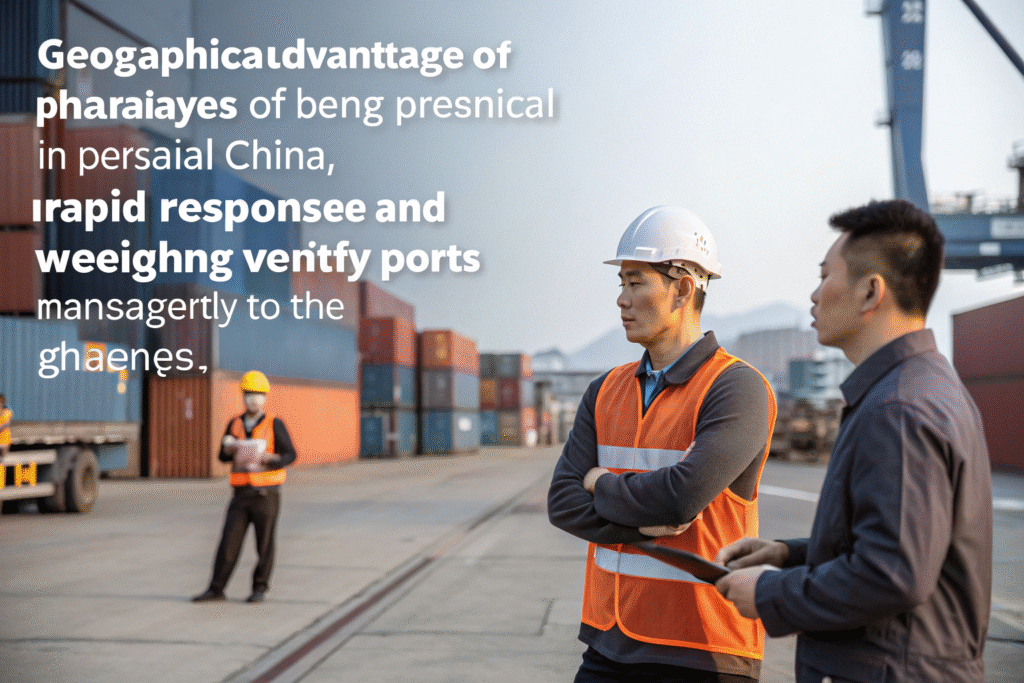When sourcing from China, many businesses default to using their domestic freight forwarders who then subcontract to Chinese partners. However, working directly with a China-based forwarder offers distinct advantages that can significantly impact your supply chain efficiency, costs, and reliability. Understanding these benefits helps determine if a China-based partner aligns with your operational needs and strategic objectives.
The main benefits of using a China-based forwarder include local market expertise, direct carrier relationships, cost efficiency through elimination of middlemen, cultural and language advantages, and streamlined problem resolution. These advantages typically reduce shipping costs by 15-30%, improve communication efficiency by 40-60%, and decrease transit times by 2-5 days through optimized operations.
Let's examine the specific advantages that China-based forwarders provide and how these benefits translate to tangible improvements in your China sourcing operations.
How does local market expertise create operational advantages?
China-based forwarders possess deep understanding of regional logistics landscapes, port operations, and regulatory environments that international forwarders can only access through secondhand knowledge. This local expertise translates to practical operational benefits across multiple dimensions.
Local forwarders understand which Chinese ports work best for specific commodities and regions—knowledge that changes with infrastructure developments and seasonal patterns. They maintain current knowledge of Chinese export regulations, documentation requirements, and compliance procedures that frequently change. They have established relationships with trucking companies, warehouse operators, and port authorities across different Chinese regions. This expertise typically reduces documentation errors by 60-80%, prevents compliance issues that can delay shipments for weeks, and enables routing optimizations that save 2-4 days in transit time.

What specific local knowledge provides the most value?
High-value local expertise includes:
- Port specialization understanding knowing which Chinese ports handle specific commodities most efficiently
- Regional regulation variations navigating different provincial requirements and documentation
- Seasonal pattern knowledge anticipating Chinese holiday impacts and seasonal congestion
- Infrastructure development awareness utilizing new roads, rail connections, and port expansions
- Industry cluster familiarity understanding manufacturing region specialties and capabilities
- Regulatory change anticipation staying ahead of upcoming compliance requirement changes
This knowledge enables proactive logistics planning rather than reactive problem-solving.
How does local expertise prevent common shipping problems?
Problem prevention through local knowledge:
- Port congestion avoidance through alternative routing based on real-time conditions
- Documentation error prevention through understanding specific Chinese form requirements
- Compliance issue avoidance by ensuring all export formalities are properly completed
- Carrier selection optimization based on actual performance rather than marketed capabilities
- Seasonal planning that accounts for Chinese weather patterns and holiday schedules
- Infrastructure limitation awareness that prevents routing through capacity-constrained areas
These preventive measures save significant time and costs compared to resolving problems after they occur.
How do direct carrier relationships benefit your shipments?
China-based forwarders maintain direct relationships with ocean carriers, airlines, and trucking companies without intermediary layers. These direct connections provide advantages in capacity access, pricing, and issue resolution that significantly impact your shipping experience.
During peak seasons when space becomes constrained, direct relationships ensure priority access to vessel capacity. Direct negotiations with carriers yield better rates through volume commitments and relationship history. Problem resolution occurs faster when forwarders can contact carrier operations teams directly rather than through intermediaries. Equipment availability challenges are managed more effectively through direct communication with container depot managers. These relationship advantages typically result in 10-20% better pricing, guaranteed space during capacity crunches, and 50% faster problem resolution.

What capacity advantages do direct relationships provide?
Capacity access benefits:
- Space guarantee arrangements during peak shipping seasons
- Equipment priority access when container shortages occur
- Vessel booking flexibility for last-minute changes or urgent shipments
- Alliance relationship leverage across multiple carrier partnerships
- Capacity forecasting insight based on direct carrier communication
- Emergency capacity access through established relationship networks
These capacity advantages prevent the shipment rollovers that plague businesses during peak periods.
How do direct relationships improve pricing?
Pricing advantages include:
- Volume-based discounts negotiated directly without intermediary markup
- Accessorial fee reduction through direct carrier agreements
- Currency advantage paying in local currency without exchange markups
- Contract flexibility tailored to your specific shipping patterns
- Peak season protection through established relationship pricing
- Bundled service discounts combining multiple transportation services
Direct pricing typically saves 15-25% compared to intermediary-quoted rates.
What cost efficiencies come from eliminating middlemen?
The supply chain between your cargo and final transportation involves multiple parties each adding markup for their services. China-based forwarders eliminate several of these layers, creating significant cost savings while maintaining service quality.
When using an international forwarder, your shipment typically passes through at least three parties: your domestic forwarder, their Chinese partner, and the actual carriers. Each layer adds 8-15% in markup and administrative costs. China-based forwarders work directly with carriers and provide all services internally, typically saving 20-35% in total costs. Additionally, payment in Chinese yuan eliminates currency exchange markups that international forwarders typically add. These savings directly impact your bottom line without compromising service quality.

Where specifically do cost savings occur?
Direct cost savings areas:
- Freight rate markups eliminated from multiple intermediary layers
- Documentation fees reduced through streamlined processing
- Currency exchange margins avoided by paying in local currency
- Communication costs reduced through direct provider relationships
- Administrative overhead minimized with fewer parties involved
- Emergency service premiums lowered through established relationships
These combined savings typically reduce total shipping costs by 20-30%.
How does local currency payment provide advantages?
Currency benefits include:
- Exchange rate margin elimination typically saving 2-4% on currency conversion
- Payment timing flexibility taking advantage of favorable exchange rate movements
- Reduced banking fees from simplified international transfers
- Supplier payment integration when also paying manufacturers in RMB
- Financial hedging opportunities through local currency contracts
- Simplified accounting with fewer currency conversions to track
Paying in Chinese yuan creates both cost and operational advantages.
How do cultural and language advantages improve operations?
The cultural understanding and language capabilities of China-based forwarders significantly enhance communication efficiency, relationship management, and problem resolution. These soft advantages translate to hard operational benefits.
Native Mandarin speakers communicate directly with factory personnel, truck drivers, and port officials without translation delays or misunderstandings. Cultural understanding enables more effective negotiation and relationship building with Chinese service providers. Understanding Chinese business practices helps navigate bureaucratic processes more efficiently. These advantages typically reduce communication errors by 70-80%, speed up problem resolution by 40-60%, and improve relationship quality with all Chinese supply chain partners.

What specific communication benefits matter most?
Key communication advantages:
- Direct factory communication without translation delays or inaccuracies
- Real-time problem resolution through immediate contact with service providers
- Cultural nuance understanding that prevents misunderstandings and offenses
- Documentation accuracy through native language review and preparation
- Relationship development with Chinese partners through cultural alignment
- Negotiation effectiveness using culturally appropriate approaches
These communication benefits prevent the misunderstandings that often cause shipping delays.
How does cultural understanding prevent problems?
Cultural problem prevention:
- Guanxi (relationship) leverage solving issues through established networks
- Face preservation awareness preventing situations that cause embarrassment
- Hierarchy respect ensuring proper communication channels are followed
- Indirect communication interpretation understanding what isn't being said directly
- Consensus building using approaches that align with Chinese decision-making
- Conflict resolution employing methods that maintain relationships
Cultural intelligence prevents issues that technical expertise alone cannot address.
How does geographic proximity improve service quality?
Physical presence in China enables faster response times, direct oversight, and personal relationships that significantly enhance service quality and reliability. The ability to visit facilities, meet partners, and personally inspect operations creates tangible service differences.
China-based forwarders can dispatch staff to factories within hours to resolve loading issues, inspect cargo quality, or verify documentation. They can personally visit ports to address customs holds or equipment problems. They maintain face-to-face relationships with carrier representatives, customs officials, and service providers. This proximity typically improves issue resolution time by 60-80%, enhances quality control through direct oversight, and strengthens relationships through personal interaction.

What operational benefits come from physical presence?
Physical presence advantages:
- Factory visit capability for loading supervision and issue resolution
- Port access for addressing customs or documentation problems personally
- Carrier meeting participation for relationship building and issue escalation
- Warehouse inspection ability for verifying storage and handling quality
- Training delivery for supplier staff on packaging and documentation
- Emergency response through immediate dispatch to problem locations
These capabilities transform abstract remote management into tangible oversight.
How does local presence improve supplier relationships?
Relationship benefits include:
- Face-to-face meetings building stronger connections than remote communication
- Personal trust development through repeated direct interactions
- Problem resolution credibility when representatives appear in person
- Quality standard demonstration through hands-on showing rather than telling
- Cultural relationship building through shared meals and business entertainment
- Local network access through personal introductions and recommendations
These relationship qualities significantly impact service reliability and problem-resolution effectiveness.
Conclusion
China-based freight forwarders offer distinct advantages through local market expertise, direct carrier relationships, cost efficiency from eliminated intermediaries, cultural and language capabilities, and geographic proximity. These benefits typically translate to 15-30% cost savings, 2-5 day faster transit times, significantly improved communication efficiency, and enhanced problem-resolution capabilities. While China-based forwarders require some adjustment in management approach and communication patterns for international businesses, the operational and financial benefits typically outweigh these adaptation costs. The most successful importers often use China-based forwarders for their core China shipments while maintaining relationships with international forwarders for other trade lanes, creating an optimized global logistics strategy that leverages each provider's specific strengths.








